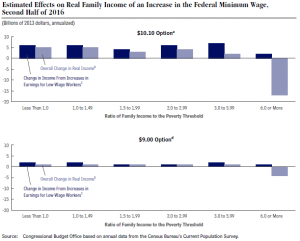 Once again, the Congressional Budget Office is weighing in on a current policy debate—in a just-released report, they have sided with the consensus view among economists that an increase in the minimum wage will eliminate jobs: “Most [low wage workers] would receive higher pay that would increase their family’s income, and some of those families would see their income rise above the federal poverty threshold. But some jobs for low-wage workers would probably be eliminated, the income of most workers who became jobless would fall substantially, and the share of low-wage workers who were employed would probably fall slightly.” If the minimum wage goes to $9/hour, CBO estimates job loss of about 100,000 in the second half of 2016, relative to what might otherwise have occurred. If the minimum wage rises to $10.10, they estimate the loss at about 500,000 jobs.
Once again, the Congressional Budget Office is weighing in on a current policy debate—in a just-released report, they have sided with the consensus view among economists that an increase in the minimum wage will eliminate jobs: “Most [low wage workers] would receive higher pay that would increase their family’s income, and some of those families would see their income rise above the federal poverty threshold. But some jobs for low-wage workers would probably be eliminated, the income of most workers who became jobless would fall substantially, and the share of low-wage workers who were employed would probably fall slightly.” If the minimum wage goes to $9/hour, CBO estimates job loss of about 100,000 in the second half of 2016, relative to what might otherwise have occurred. If the minimum wage rises to $10.10, they estimate the loss at about 500,000 jobs.
Every policy change has good and bad effects. If the goal is to maximize the number of jobs, we should eliminate the minimum wage entirely. But that would open up some workers to a level of exploitation most of us would find unacceptable, so we put up with some degree of job loss in exchange for this protection. And we counter the effects of the minimum wage on labor demand by putting more money into improving the employability of low wage workers, thus boosting the supply of workers who are more productive.
But as the CBO report asserts, the minimum wage does reduce labor demand. Low wage workers live in a competitive labor market—not only do they compete with low wage workers from other countries, but they also compete with technology. Consider the food business: Some restaurant chains have implemented the Ziosk ordering system, which places a tablet computer at every table, allowing the diner to review the menu, place an order, and pay the bill without talking to a server. Both Chili’s and Uno’s are testing the Ziosk system. The “server” will do only that—serve the food. In my days as a waiter, I learned that getting a good tip depended on reading the mood of the diner—and there were times when I’d get a better tip by pretending to be a computer! Other diners want their server to be their new best friend, however. They may request more attention from the Chili’s server or they may choose to go to a place “where everyone knows your name.”
There are winners & losers
Re-read the CBO quote, however. While there will be fewer low wage jobs, the workers who keep their jobs will see higher family incomes. In fact, CBO estimates that total family income will rise for every income group, except for the group of families earning six times the poverty line or more.
They predict a shift of income from the payers of the higher wage—business owners—to the lower income wage earners. But there will be winners and losers in every income class.
Pick your poison
We may choose to raise the minimum wage—and there are good reasons to do this. A more equal distribution of income is a good thing. As the CBO estimates a shift of income from higher income families to lower income families, this would be part of the impact. But let us not adopt the naïve position that the only losers are “fat cat” business owners. Low wage workers who retain their jobs will win; low wage workers who don’t will lose. It is rare that consequential public policy has wholly positive effects.
